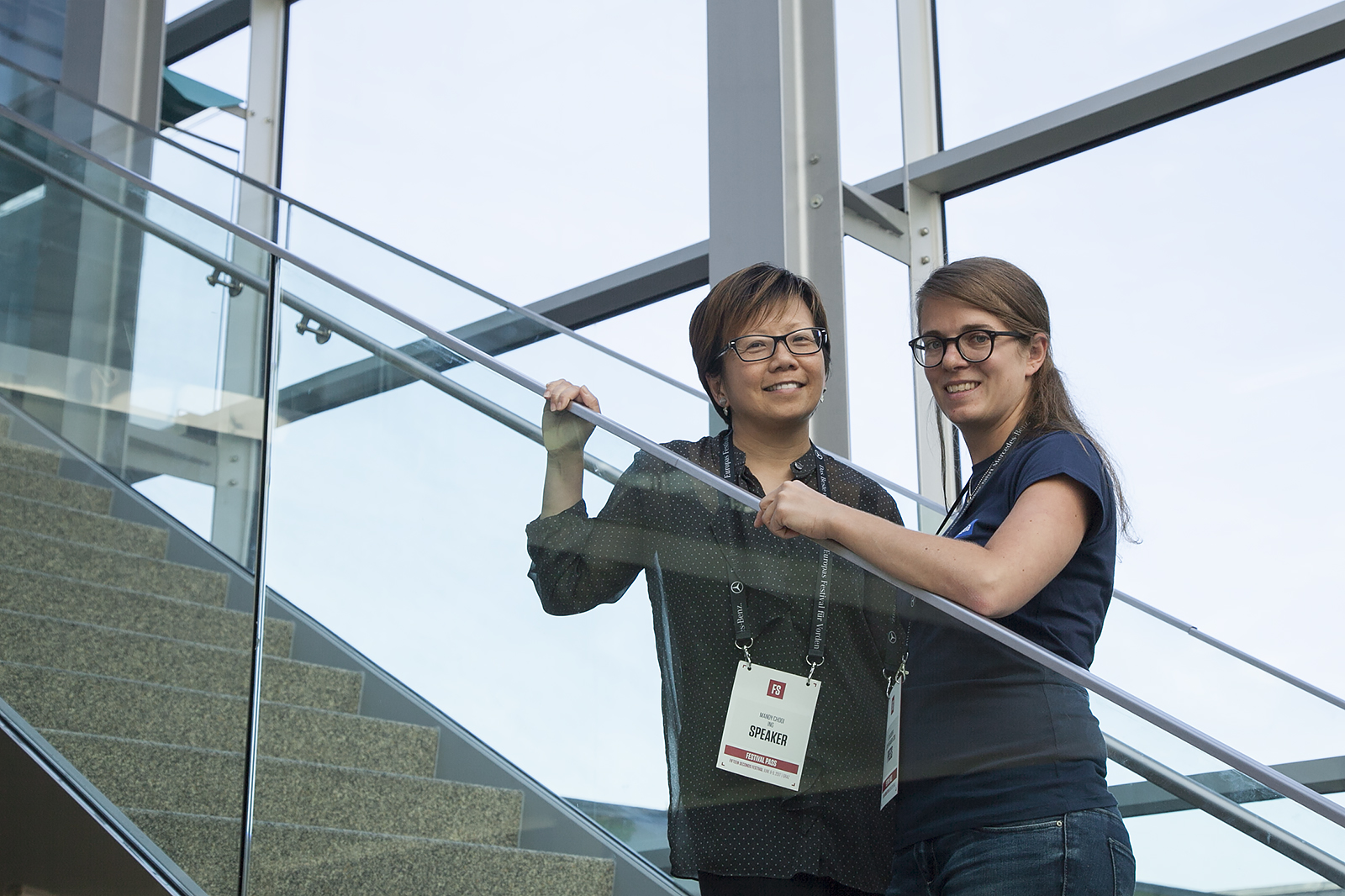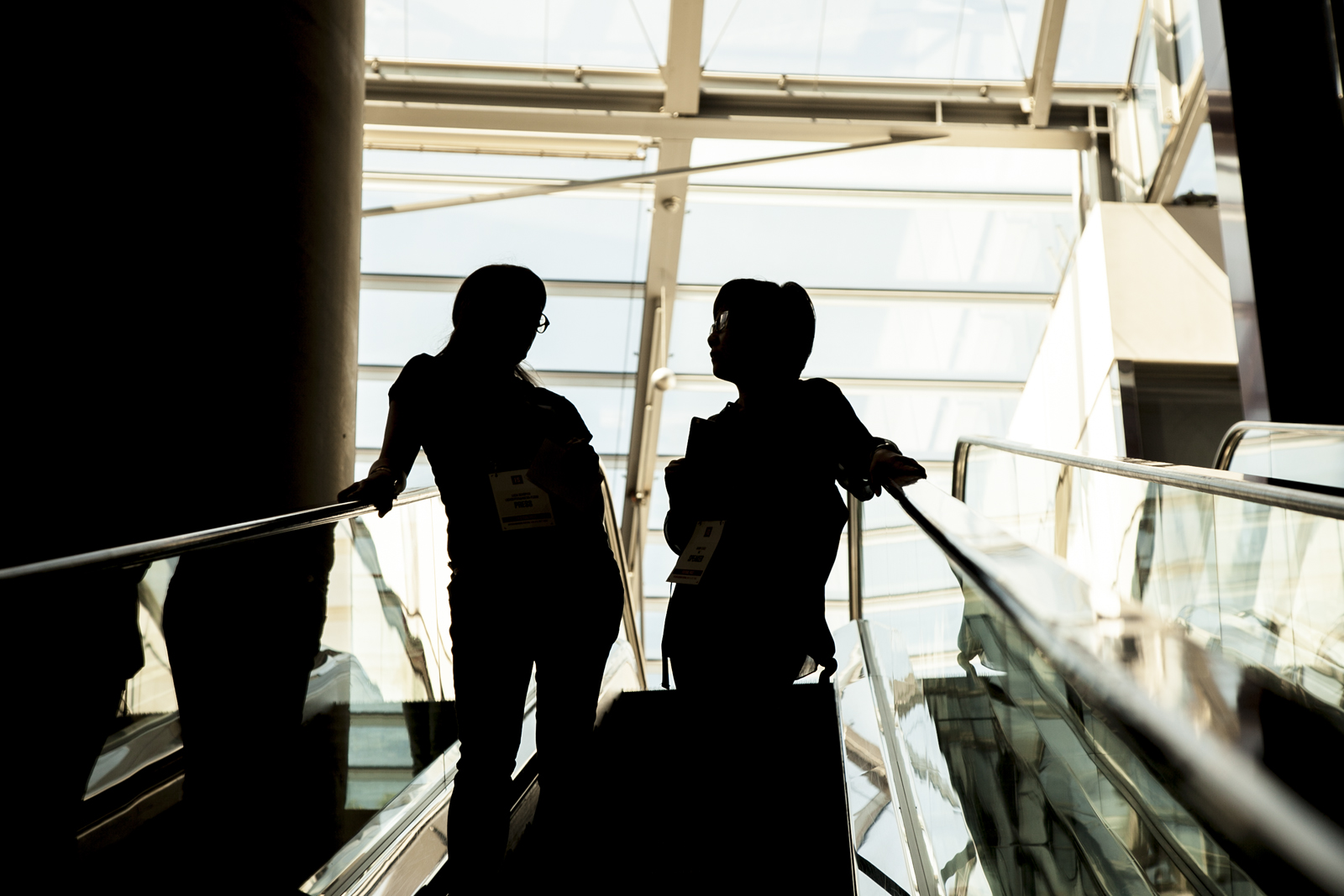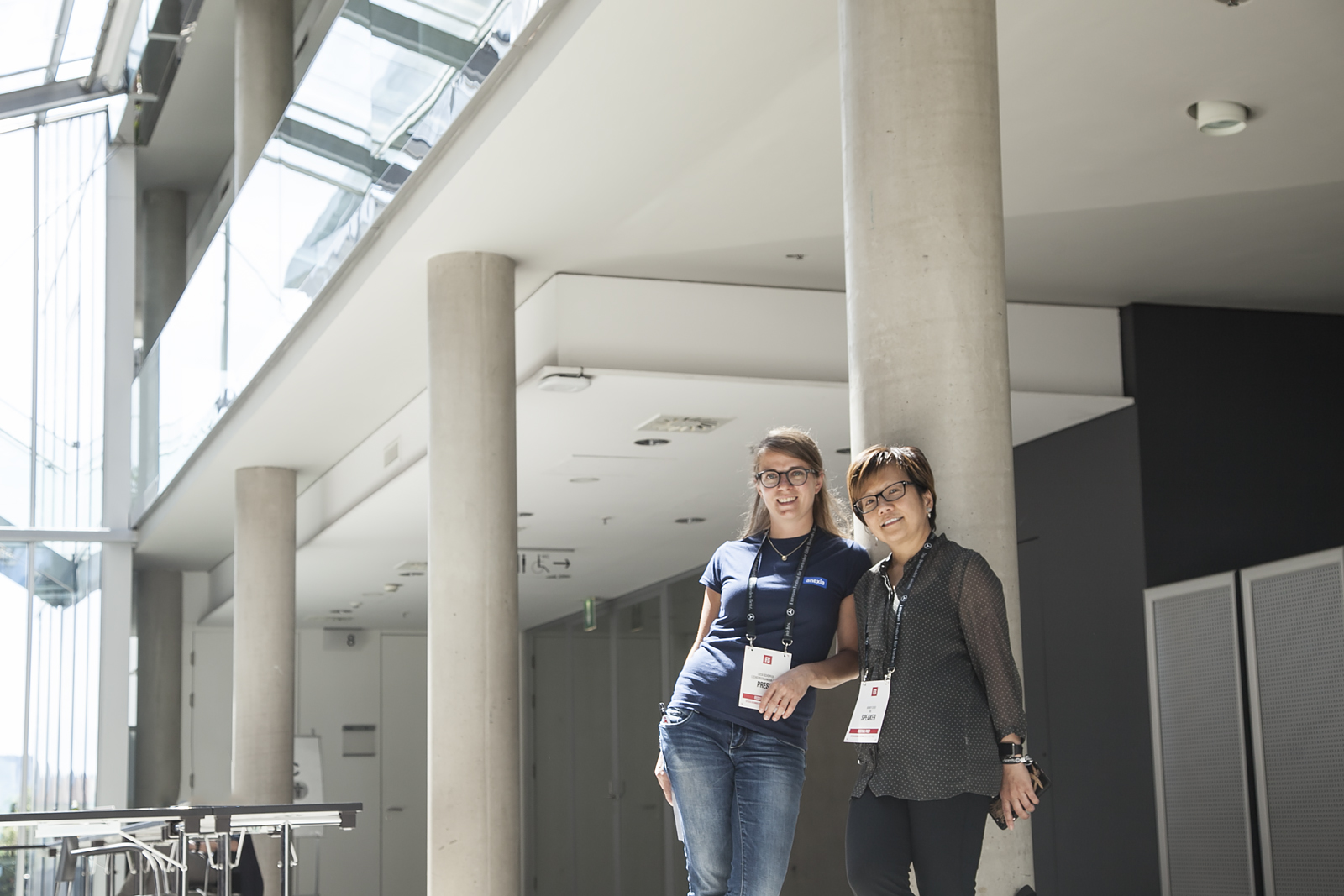How to handle disruption: “Bring your whole self in there”
“Challenging the status quo” was the motto of the Fifteen Seconds Festival in Graz last week – a business conference gathering for all curious minds in the global community of leaders, creatives and innovators. Anexia is joining the wonderful event as a partner again this year. So first of all, thanks for the amazing input and enlightening discussions we were able to take part in. And of course, we want to share some of the input with our readers as well.
One of the big issues this year was ‘talent’ ─ for the first time a special stage focused on keynotes regarding this topic. How can organizations be structured so that talents find their space to evolve and innovation can happen? One of the most inspiring speaker there was Mandy Chooi.
Mandy is former Global Director of HR Strategy & Innovation at ING. She has just quit this job two months ago to start her own consultancy. On stage, she spoke about her idea, that companies need to be self-aware too, not just people. Before she went on stage, I was lucky enough to catch her for an interview. I asked Mandy about herself and her nomadic lifestyle, why disruption is important and how companies can provide and survive an environment of disruption.
Mandy, would you be so kind and introduce yourself briefly?
Sure. My name is Mandy Chooi. I have lived in seven countries, which I think is pretty amazing. I was born in Malaysia, grew up in Canada, and did all my university education there. Then I left Canada and my career took off pretty fast. I started at Motorola, where I did management consulting. And then I worked at Honeywell, and then at Johnson and then ING. Most of my career has been focused on human strategy, which means: how do you design an organization, so that you get the best out of people.
You already mentioned you lived in several countries. I read an article about you, where you say, the hardest question to answer for you is “Where am I a local.” Have you found an answer so far?
Actually, that’s a good question, that’s the question I would prefer to answer. The hardest question for me to answer is ’Where are you from’. I cannot answer that. There isn’t any one country where I lived so long that I can say, this is where I’m from. So that’s why I say, I would prefer it if people would ask me the question “where are you local,” because that way I get a chance to talk about specific places. There are certain parts of Chicago, in Thailand or in Amsterdam, where I feel like I am local. Even though I lived in China for a very short time, there is a particular area on the east bank of the river in Pudong, where I feel very, very much at home, and I feel like I’m local.
So, that’s why I prefer that type of question, because then you start talking and have a nice conversation.
You live a nomadic lifestyle. Did this lifestyle have an influence on your career?
It had a huge impact. I think it all started with the sort of person that I am. My parents are telling me stories of when I was five yours old and declaring to everybody that I was going to go to this country and that country and go to space and whatever. I was just never somebody who felt rooted in one place. I always wanted to see all the countries of the world because that’s the sort of person that I am. And then, when career opportunities started to show up, I always chose options that gave me the most maximum change. It would usually be different country, different industry, different language. It was always more important for me to get maximum disruption in every move rather than to go straight up the career ladder. I wasn’t even aware I was designing my career in the early stages, I just did what I loved to do, seeing the world. And doing so, I learned a whole different way of thinking, which affected my career. This was in the late 1990s early 2000s, when all the companies in the world were being globalized. And there were looking for talent, who were a) willing to go and work in different parts of the world and b) already have experience in this. I fitted in there.
You first started to study arts and then switched to psychology. Did this switch and the fact that you are an expert in different fields also affect your career?
Actually, that one is kind of interesting. My father was an art collector. He was always in the art world, a lot of his friends were artists. So, all the time when I was growing up, I had really good teachers, who were successful artists. Anyway, long story short, up until I was 17 years old, I thought I was going to be an artist. I had art lessons, I was painting every day. But my father being that Chinese parent he is, he decided, no, that is not a serious career. You need to have a serious career. So anyway, couple of discussions later, he won. I had to have a serious degree from a serious university. But in retrospect, I think both sides helped me. Without the serious degree, I would not have had such a wonderful career in large companies. But without the art I would be normal. (laughs) I think that was one of the things that set me apart. There were many people who did what I do, but they didn’t do it with the creativity, the ability to look at things from completely weird angles. Creativity and design matters. Whatever you do, you need creativity and you need design.
Creativity and design matters. Whatever you do, you need creativity and you need design.
Did you realize that almost 50% of the speakers at the Fifteen Seconds Festival are women? Do you often meet women at conferences or is it still more a male dominated world you’re working in?
Ah, that’s nice with the 50%. Actually, it is often very different, if I meet other women and also the way I am treated as a woman differs. It depends on the company culture and sometimes it depends on the country and its culture, too. I can still see a big difference, even today, how women in business are treated. But in general, I can definitely say that now versus 20 years ago there has been a very big improvement.

Thanks a lot for the insights to your career. Let’s focus now a bit more on the topic you are speaking about here on stage. The title of you keynote is “Companies Need to Be Self-Aware too, not just People.” Why do companies need to be self-aware?
The world is changing so fast and it is forcing companies and leaders to make decisions very, very fast. We are making huge decisions that have implications on technology, on humanity with no precedents. You cannot point somewhere and see the best practice up there. That option doesn’t exist anymore. You have to come up with the solutions yourself. In addition, your decisions are based on very little data, very little certainty, and certainly on no promise of success. In this ambiguous, complex environment, I think the only thing that you can count on is your character as a person, and as an organization.
So, is this character formed by self-awareness?
Yes. And this is what I define as self-awareness. It comes in three: Do you have a purpose? Do you know your sweet spot? And are you authentic? These are the three things, whether you are a person or a company, you need to be self-aware.
So, do you have a purpose? This is what you stand for. As a person, when everything has been stripped away, you lost everything, you’re totally confused and you have no guidance, you still know what you stand for and what you will not compromise with. And it’s the same thing with a company. Discover your purpose, know what you stand for as a company, and then take a deep hard look at all the processes, all the decisions, all the practices, and policies you have in your company. Do they all line up exactly and support your purpose?
The next thing is your sweet spot. Do you play tennis or golf? The sweet spot is the moment when you hit the ball just in the right spot. It’s beautiful, it is effortless, and the ball goes exactly where you want it to go. As a person, you need to find your sweet spot, which is that intersection of your strengths and your motives. When you find that spot, make sure you operate from that spot as much as possible, because this is where you are going to do your best work. And it’s the same with a company. Sometimes, because everybody is talking about innovation, innovation, innovation, companies lose their focus. They try to keep all options open, but that diffuses them. Failure in innovation is rarely due to good ideas, it is usual a lack of focus. So, find your sweet spot, know what your company does better than any other company does, know what you suck at and don’t go on and do that. Make sure your company operates from the sweet spot.
And the third point is authenticity. Show authenticity. To me that means having the courage to bring your whole self to work. It doesn’t work to compartmentalize. You can’t say this is my work person, but at home I am my home person. No. Being authentic is the same as being whole as being of high integrity. It means, everything from your thoughts to your words to your actions to your tweets to your blogs, everything has to be consistent. And same with the company. You need to be very clear, that this is what you stand for and this is what all of your practices are based on.
So yeah, that is why I say a self-aware company is a company that understands its purpose, that understands its sweet spot and operates from there and knows how to show up authentically and bring its whole self there.
Is failure and talking about failure a part of authenticity?
Yes, absolutely. When I designed the leadership program for ING, one of the major element of the program was ‘Showing your vulnerability’. Being OK with talking about your failures in front of the team is important, because I think sharing your story and showing the people what they normally don’t see will instantly create a new kind of bond.
Why is innovation so essential for companies these days?
Well, I think innovation is so essential because the world is changing so fast. There are some of these megatrends that are hitting companies. The pace of change is so fast, that if you don’t keep reinventing yourself, if you just keep doing what you are doing, everybody will get ahead of you. Standing still is the same as moving backwards. So, that is why it is really important for a company to keep reinventing itself. And to me, innovation is a way of thinking and a way of organizing of working so that your company is able to come up with ideas that disrupt itself.
So innovation is a way to disrupt yourself. Why is it important to be willing to disrupt yourself?
The path to survival lies in innovation and the willingness to disrupt yourself. I have the example from ING, one where I am really proud of ING. It was a tough decision for me to leave, because I loved working there so much. One of the things that ING does incredibly well is, that it openly declares, ”we are willing to disrupt ourselves.” ING is a bank that funds several fintech startups, which are trying to find out how do you allow people to do their finance in a way that makes banks obsolete. It is just to have the courage to say, the disruption is going to happen anyway, but we may as well participate in the innovation.
Why is it so difficult to declare innovation in a company?
Because once you declare your path forward is through innovation, it has huge implications on the design of your company. Once you make that decision, you need to take that long hard look at everything. How do you do things in your company, the structure, the job titles? How you pay people? How you treat failure? How you build teams? How are projects funded? You might need to completely redesign all of these things. And it all starts with this choice and this attitude of, yep, we’re going to be an innovative company.
Thanks Mandy for the interesting conversation!
If you want to know more about Mandy Chooi, follow her on twitter.
If you want to stay updated about the events Anexia is joining in the future, check our event website.


